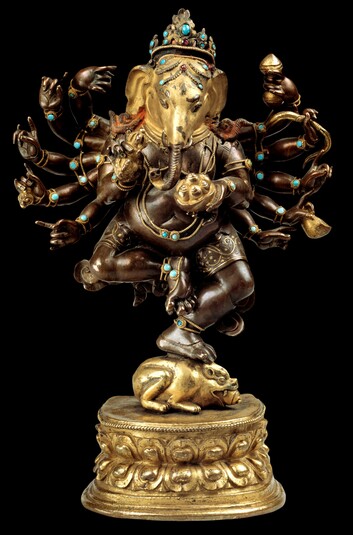
Item: Ganapati (Indian God & Buddhist Deity) - Red (12 hands)
| Origin Location | Tibet |
|---|---|
| Date Range | 1600 - 1699 |
| Lineages | Buddhist |
| Size | 24cm (9.45in) high |
| Material | Metal, Gold Inlay, Stone Inset: Coral, Turquoise, Ruby |
| Collection | Rubin Museum of Art |
Classification: Deity
Appearance: Animal-Feature
Gender: Male
Summary: This form of Ganapati is an emanation of Lokeshvara.
Ganapati, Maha Rakta (Tibetan: tsog gi dag po, mar chen. English: The Great Red Lord of Hosts). A Tantric Buddhist form of Ganapati (Ganesha) related to the Chakrasamvara Cycle of Tantras. This form of Ganapati is regarded as an emanation of Avalokiteshvara.
"...beside a lapis lazuli rock mountain is a red lotus with eight petals, in the middle a blue rat expelling various jewels, [above] Shri Ganapati with a body red in colour, having an elephant face with sharp white tusks and possessing three eyes, black hair tied in a topknot with a wishing-gem and a red silk ribbon [all] in a bundle on the crown of the head. With twelve hands, the six right hold an axe, arrow, hook, vajra, sword and spear. The six left [hold] a pestle, bow, katvanga, skullcup filled with blood, skullcup filled with human flesh and a shield together with a spear and banner. The peaceful right and left hands are signified by the vajra and skullcup filled with blood held to the heart. The remaining hands are displayed in a threatening manner. Wearing various silks as a lower garment and adorned with a variety of jewel ornaments, the left foot is extended in a dancing manner, standing in the middle of the bright rays of red flickering light." (Ngorchen Konchog Lhundrup, 1497-1557).
"The elephant-headed god of wealth, Ganapati, appeared to the siddha, Zangtsa Sonam Gyaltsen, during his meditation and carried him up to the highest peak of worldy existence. Looking out eastward from this vantage-point, Zangtsa saw the kingdoms of Tibet, China and Mongolia stretching out into the distance below him, but the great expanses beyond them so unnerved him that he dared not look further. The deity informed him, "Because you dared not look further, dominion over these lands which you have seen will belong, not to you, but to your descendants. Had you looked further, you would have become the ruler of the universe."
In order to fulfil his prophecy, Ganapati approached an elderly sage living in solitude at gLang-dor. This great hermit, Se-ston Ripa, was a pillar of the Kahdampa order, a writer of many books and an emanation of the Bodhisattva Avalokiteshvara. The deity requested him to take rebirth in Sakya as the son of Zangtsa Sonam, and Se-ston Ripa agreed." (A Gift of Dharma to Kublai Khan By Chogyal Phagpa, Seventh Patriarch of Sakya. Ngorchen Konchog Lhundup, Ngor chos 'byung, folia 323-328. Translated by Jared Rhoton, 1976).
This form of Ganapati belongs to a set of three powerful deities known as the 'mar chen kor sum' or the Three Great Red Deities included in a larger set called 'The Thirteen Golden Dharmas' of Sakya. The other two deities are Kurukulle and Takkiraja.
Jeff Watt 8-2001
Buddhist Deity: Maharakta Ganapati (Three Great Sculpture)
Video: Three Minute Himalayan Art (YouTube)
Buddhist Deity: Ganapati, Maharakta (Masterworks)
Buddhist Deity: Ganapati Main Page
Collection of Rubin Museum of Art: Sculpture (Gallery 1)
Buddhist Deity: Ganapati, Maharakta Main Page
Buddhist Deity: Ganapati, Maharakta Art History
Collection of RMA: Selected Sculpture
Collection of Jourdan-Barry
Buddhist Deity: Ganapati Masterworks
Sculpture: Gilding & Cold Gold




